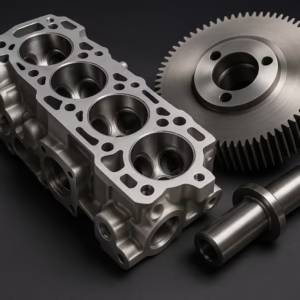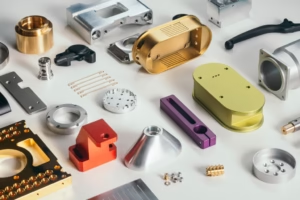Blog Detayları

Özel CNC İşleme Parçaları Dünyasını Keşfetmek
In a world where precision and customization are paramount, the art of custom CNC machining parts stands above the rest. From aerospace to automotive industries, these intricate components play a crucial role in creating efficient and high-performance machinery.
Every screw, every bolt, every gear is meticulously crafted with precision using state-of-the-art CNC (Computer Numerical Control) machining technology. This advanced process allows for the production of parts with impeccable accuracy, tight tolerances, and intricate designs.
Custom CNC machining offers endless possibilities for manufacturers and businesses seeking to create unique and tailored solutions. Whether it’s prototyping, product development, or mass production, CNC machining provides the flexibility to bring ideas to life with unparalleled precision.
With the ability to work with various materials, including metals, plastics, and composites, custom CNC machining parts can be used across a wide range of industries. From complex medical devices to intricate electronics, these parts optimize functionality, durability, and performance.
Join us on a journey as we explore the exciting world of custom CNC machining parts and discover how these precision-engineered components are revolutionizing industries and driving innovation forward.
Advantages of custom CNC machining parts
Custom CNC machining parts offer numerous advantages over traditional manufacturing methods. One of the key benefits of CNC machining is its ability to produce highly accurate and consistent parts. The use of computer-controlled machines eliminates human error, resulting in parts that meet exact specifications every time.
Another advantage of custom CNC machining parts is their versatility. CNC machines can work with a wide range of materials, including metals, plastics, and composites. This flexibility allows manufacturers to create parts that are suitable for various applications and industries.
Additionally, CNC machining parts can be produced at a faster rate compared to other manufacturing processes. The automated nature of CNC machines enables continuous operation, reducing production time and increasing efficiency. This is especially beneficial for businesses with tight deadlines and high-volume production requirements.
The process of custom CNC machining
The process of custom CNC machining involves several steps to transform a design into a physical part. It begins with the creation of a 3D model using computer-aided design (CAD) software. The model is then converted into a program that the CNC machine can understand.
Once the program is ready, the material is loaded onto the machine. The CNC machine uses various tools, such as drills, mills, and lathes, to shape the material according to the programmed instructions. The machine precisely moves along the X, Y, and Z axes, removing excess material and creating the desired shape.
Throughout the machining process, operators monitor the machine’s progress and make any necessary adjustments. After the part is machined, it undergoes post-processing, which may include deburring, polishing, or surface treatment, to achieve the desired finish.
Materials used in custom CNC machining parts
Custom CNC machining parts can be made from a wide range of materials, depending on the specific requirements of the application. Metals such as aluminum, steel, brass, and titanium are commonly used for their strength, durability, and heat resistance.
Plastics, including ABS, acrylic, and nylon, are also popular choices due to their lightweight properties and ease of machining. These materials are often used in industries such as electronics and consumer goods, where weight reduction and cost-effectiveness are important factors.
In addition to metals and plastics, custom CNC machining can also be performed on composites, such as carbon fiber and fiberglass. These materials offer a high strength-to-weight ratio and are commonly used in industries such as aerospace and automotive, where weight reduction is critical for performance optimization.
Applications of custom CNC machining parts
Custom CNC machining parts find applications in a wide range of industries, revolutionizing the way products are designed and manufactured. In the aerospace industry, CNC machining is used to create complex components for aircraft and spacecraft, ensuring high performance and reliability.
The automotive industry also benefits greatly from custom CNC machining parts. CNC machines are used to manufacture engine components, transmission parts, and intricate interior and exterior components. The precision and durability of CNC machining parts contribute to the overall quality and performance of vehicles.
The medical industry relies on custom CNC machining parts for the production of surgical instruments, implants, and medical devices. CNC machining ensures that these parts meet strict quality standards and are compatible with the human body.
Other industries that benefit from custom CNC machining parts include electronics, defense, energy, and telecommunications. CNC machines are used to create intricate circuit boards, housing components, energy generation equipment, and communication devices, among others.
Factors to consider when choosing a CNC machining service provider
When choosing a CNC machining service provider, several factors should be taken into consideration to ensure a successful partnership. First and foremost, the experience and expertise of the service provider are crucial. Look for a company that has a proven track record in delivering high-quality CNC machining parts and has experience working with the specific materials and industries relevant to your project.
Another important factor to consider is the capabilities and capacity of the CNC machining facility. Make sure the service provider has the necessary equipment, tools, and technologies to meet your project requirements. Additionally, consider the production capacity of the facility to ensure that they can handle your order volume within the desired timeline.
Quality control and inspection processes should also be a priority when choosing a CNC machining service provider. Look for a company that has stringent quality control measures in place to ensure that each part meets the required specifications. This can include regular inspections, testing, and certifications to guarantee the highest level of quality.
Examples of industries that benefit from custom CNC machining parts
Custom CNC machining parts have a significant impact on various industries, enabling enhanced performance, improved efficiency, and innovative designs. One industry that greatly benefits from CNC machining is the aerospace industry. From turbine blades to landing gear components, CNC machining allows for the creation of complex and lightweight parts that meet the strict standards of the aerospace industry.
The automotive industry is another sector that heavily relies on custom CNC machining parts. CNC machines are used to manufacture engine components, transmission parts, and intricate interior and exterior components. The precision and durability of CNC machining parts contribute to the overall quality and performance of vehicles.
The medical industry also benefits greatly from custom CNC machining parts. CNC machining is used to produce surgical instruments, implants, and medical devices with high precision and quality. These parts are crucial for ensuring the success and safety of medical procedures.
Other industries that benefit from custom CNC machining parts include electronics, defense, energy, and telecommunications. CNC machines are used to create intricate circuit boards, housing components, energy generation equipment, and communication devices, among others.
Common challenges in custom CNC machining and how to overcome them
While custom CNC machining offers numerous advantages, there are also several challenges that manufacturers may face. One common challenge is selecting the right machining parameters to achieve the desired results. This requires a deep understanding of the material properties, tooling, and machine capabilities. Collaborating closely with the CNC machining service provider can help overcome this challenge by leveraging their expertise and experience.
Another challenge is managing the costs associated with CNC machining. Custom CNC machining can be expensive due to the high precision and quality requirements. To overcome this challenge, it is important to optimize the design for manufacturability and streamline the machining process. This can involve reducing material waste, minimizing tool changes, and optimizing the cutting parameters.
Maintaining the consistency and quality of CNC machining parts can also be a challenge. Variations in material properties, tool wear, and machine performance can affect the final product. Implementing robust quality control processes, such as regular inspections and testing, can help identify and address any issues early on.
Quality control and inspection in custom CNC machining
Quality control and inspection are crucial aspects of custom CNC machining to ensure that each part meets the required specifications and quality standards. CNC machining service providers employ various inspection techniques to ensure the accuracy and quality of the parts produced.
One common inspection method is dimensional inspection, where the finished parts are measured against the design specifications using precision measuring tools such as micrometers, calipers, and coordinate measuring machines (CMMs). This ensures that the parts have the correct dimensions and tolerances.
Surface inspection is another important aspect of quality control in CNC machining. It involves visually inspecting the surface finish of the parts to ensure that they meet the desired smoothness, texture, and appearance. This can be done using visual inspection equipment, such as digital microscopes and surface profilometers.
In addition to dimensional and surface inspection, other quality control measures may include material testing, hardness testing, and functional testing. These tests verify the mechanical properties, durability, and functionality of the parts.
By implementing stringent quality control and inspection processes, CNC machining service providers can ensure that each part meets the highest standards of quality and precision.
Conclusion: The future of custom CNC machining parts
Custom CNC machining parts have revolutionized industries and continue to drive innovation forward. The ability to create highly accurate, customized parts with intricate designs has opened up endless possibilities for manufacturers and businesses.
As technology advances, we can expect to see further advancements in CNC machining, including the use of advanced materials, improved automation, and enhanced precision. This will enable even greater customization, efficiency, and performance in various industries.
In conclusion, the art of custom CNC machining parts is a testament to the importance of precision and customization in today’s world. From aerospace to automotive industries, these precision-engineered components play a vital role in creating efficient and high-performance machinery. With their versatility, accuracy, and durability, custom CNC machining parts continue to shape the way products are designed, manufactured, and used.
Prototek offering professional custom CNC machining parts over 13 years. If you have any needs about metal manufacturing services, , contact us via email: Lynnyao@prototekparts.com veya telefon edin: +86-0792-86372550
Etiketler:
- CNC İşleme Parçaları
























































